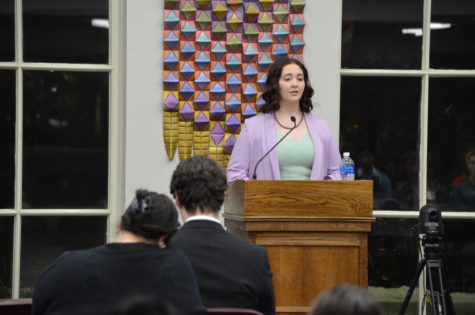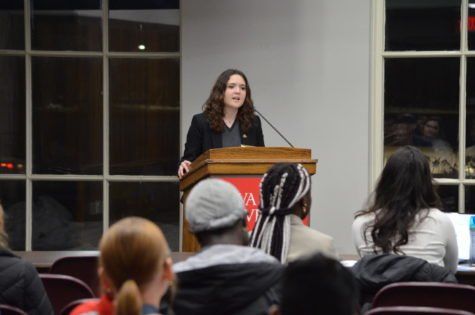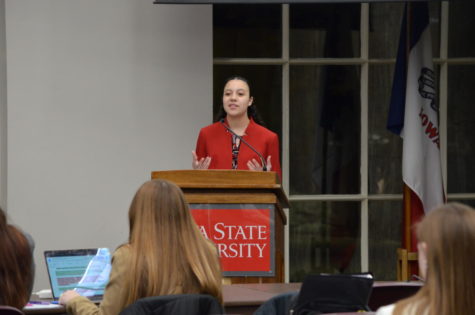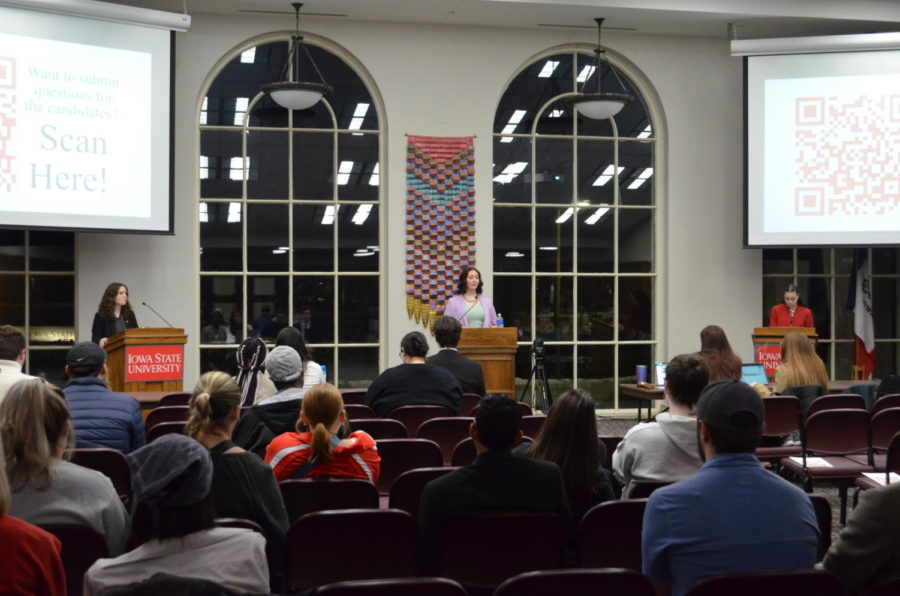Vice-President candidates spar in 3-way debate
Student Government Vice President candidates during the debate at the Memorial Union on Feb. 7.
The Election Commission hosted a debate panel featuring the three vice president candidates set to be on the ballot March 7-8.
The debate panel included: Ella Slade, a junior majoring in journalism; Jennifer Holliday, a sophomore triple majoring in agricultural studies, journalism and international agriculture; and Arilyn Oatman, a junior majoring in global resource systems.
The candidates respective running mates include: Kit Clayburn, a junior double majoring in animal ecology and biology; Emily Roberts, a senior majoring in chemical engineering; and Rebecka Larson, a junior majoring in agricultural policy.
The debate was moderated by election commissioner Cody Neeper-Burris, a senior majoring in political science, and Editor-in-Chief of the Iowa State Daily Katherine Kealey, a senior majoring in journalism.
Student Government Engagement
Neeper-Burris asked the candidates how they plan to keep members of the Senate engaged with the constituents, so that they may be able to represent them diligently.
Oatman said aside from connecting with students on campus during campaign season, members of Student Government do not do much to engage and interact with the larger student body. She shared methods she plans to employ to promote engagement with students.

“When I originally tried to join student government, I struggled with building a connection because it was them and me — someone who was new,” Oatman said. “I really want to work with our platform to make sure that Student Government is going out of their way to create events and opportunities to really connect with students who aren’t involved in Student Government at all.”
Holliday said Student Government comes down to understanding, and that she plans to help foster a culture of learning and growth among senators so that they might effectively represent their constituents during senate meetings.
“I believe that it all comes down to ensuring that our senators and other members in student government feel confident and understanding that they can go out of their comfort zone and maybe mess up a couple of times to learn how to run a senate meeting properly and participate accurately,” Holliday said.
Slade said within Student Government, there are varying levels of comfortability, which she said can cause a disconnect within Student Government and the larger student body.
“I think that we need to, as a student government, approach outreach initiatives with genuine connection in mind,” Slade said. “I know it can get easy to be lost in your position, but I think that forming genuine connections and having conversations with students…will make them feel comfortable enough to join student government.”
Voter Engagement
Only 15% of the student body votes, Kealey said, adding that the larger community remains largely uninformed about the initiatives and mission within Student Government.
Slade said to remedy the issue, she intends to hold more small-scale events to increase general awareness and aid in recruitment.
“Student Government does involve themselves in a lot of outreach opportunities, but there’s certainly room to go above and beyond with that,” Slade said. “I think efforts made at After Dark and efforts made to engage with the student body on a friendly level can actually help recruit members to Student Government.”
Holliday echoed sentiments similar to Slade, saying that her answer to the question is “outreach, outreach, outreach,” citing one of her campaign points.

“This campaign [point] is basically all about how to get students active in student, local and state governments, because many students here do not know how to participate in any way shape or form,” Holliday said. “We want to provide education resources on all of these topics.”
Oatman said when she first came to Iowa State, she did not know there was a Student Government. She said that is indicative of a fundamental problem with Student Government, and she wants to get away from the only means of communication with students being over email.
“I know personally, today, I got 15 emails, and I didn’t have time to read all of them; as Student Government, we need to go above and beyond just emailing people,” Oatman said. “We need to continue to do that outreach like we do during those two days when the election is going on, so that we can truly connect with students on a personal level and inform them about what Student Government is — not just what they’re doing.”
Sustainability
Kealey asked the candidates if they believe there are any sustainability initiatives the university should adopt, citing the city of Ames Climate Action Plan.
Oatman said as an agriculture major, she is always learning about sustainability.
“I spend a lot of my time on how to stay learning about sustainability, learning about the sustainability efforts that we have — which is why part of our platform is looking at that beautification of Iowa State and ensuring that we’re taking care of our land,” Oatman said. “Because it’s not just what we’re putting in, it’s what we have, and making sure that we are caring for it.”
Holliday said sustainability is the key of Iowa State.
“We are a science and technology based institution, and sustainability is all about science and technology, and using our resources,” Holliday said. “Our goal is to increase the number of recycling compactors on campus because we want recycling to be a part of your everyday life […] students will be more apt to participating in simple life tasks such as recycling if it is accessible.”
Slade said she would like to see the recently doubled budget of the green initiatives fund effectively used.
“There have been some projects [that have] come out within the health and wellness committee, but I’m excited to see more developments using the green initiatives fund,” Slade said. “We have so much room to expand on the projects that are being developed right now.”
Campus sexual assaults
Neeper-Burris asked the candidates with a total of seven sexual assaults reported on campus this school year, what resources are available to candidates, and whether or not they are sufficient.
All of the candidates agreed that could never be enough resources to aid victims of sexual assault.
Holliday said students have access to Iowa State’s police department, a 24/7 crisis text line and student counseling services, but also shed light on other resources she described as “not so well known.”
“[Resources] include free forensic exams at Thielen, changes to class schedules if need be and even escort services and safety planning on and off campus,” Holliday said.
Holliday added that she aims to include mandatory sexual assault training in 110 courses for freshman and transfer students.
Oatman said while she wants to address sexual assault, there is only so much Iowa State can legally do.

“We want to ensure that we are providing more resources [such as] counseling, continuing with being able to change classes, getting those escorts, to make them feel as safe as possible here in Iowa State,” Oatman said.
Slade mentioned the Iowa State Safe app as a resource available to students, which offers access to Safe Ride and virtual walk-homes, among other safety features.
“I think that is a big step toward making sure that our students feel safe and secure on our campus,” Slade said.
Campus counseling
Oatman said she has had negative experiences with the university’s counseling services, and wants to hold them accountable.
“I want to make sure that our counseling services, if they promised to help, are actually following through with that,” Oatman said. “Whether it’s an email or phone call, because these hospitalizations are happening because students don’t feel connected […] we need to make sure that we are conducting listening, [and] checking in on them to ensure that these things don’t happen.”
Slade said campus resources for mental health are on the rise due to the growing demand from students, adding that Student Government initiatives like the Health and Wellness Symposium and the university’s online counseling services are helpful, but noted the importance of students being informed of these resources.
“The biggest issue that we can take part in fixing is awareness of these resources,” Slade said. “A lot of students don’t know how to access them or don’t know that they were there, and I think that is something that we can take action on.”
Holliday said similar to resources available to survivors of sexual assault, resources for students dealing with mental health issues can never be abundant enough.
“Emily and I’s platform would work to add community based counseling to the already added Student Counseling Services there are,” Holliday said. “Community based counseling would be based around areas in which you identify in, whether that be racial identity, sexual orientation– or even if you happen to be a first generation student like myself.”
Holliday added that along with adding community based counseling services, she would like to apply for a fall break.
“It would allow us to take one day off in the month of October, whether it be a Monday or Friday, to give students a three-day weekend,” Holliday said.
Your donation will support the student journalists of the Iowa State Daily. Your contribution will allow us to purchase equipment, send our student journalists to conferences and off-set their cost of living so they can continue to do best-in-the-nation work at the Iowa State Daily.











